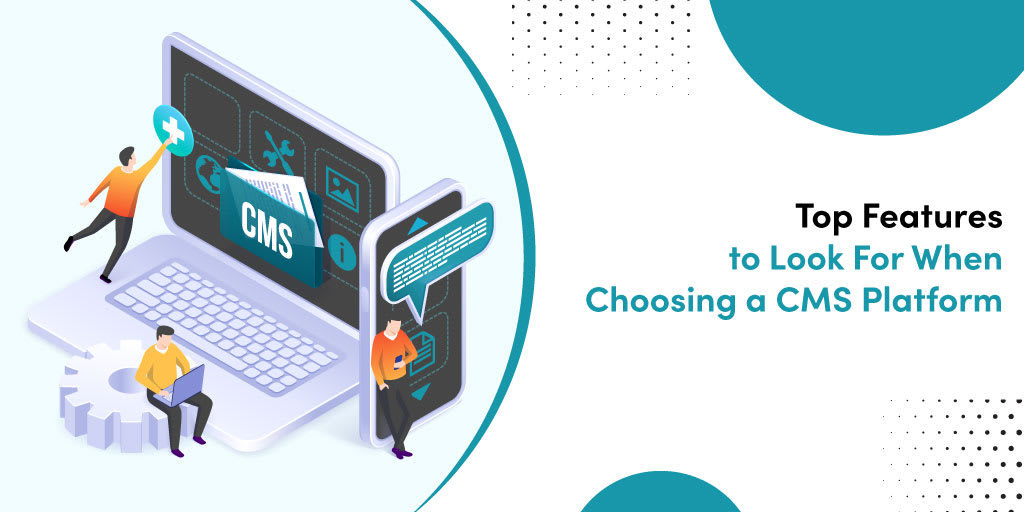Top Essential Features to Look For When Choosing a CMS Platform
Top Essential Features to Look For When Choosing a CMS Platform

The dependency on websites has slowly and steadily become a necessity for most industries. Its need is exceptional for personal blogs, company or e-commerce websites. These Websites can be effectively handled using Content Management System (CMS). It directly offers users the functionality to design, analyze any site code and update the content at any time. Now, with varied needs, several types of CMS are available in the market. But depending on your company's needs, selecting one among these is a tough choice. In this blog, we unravel the essential top features to look forward to when choosing your CMS system.
Why is a CMS Important in a Business?
A content management system (CMS) is a software application or set of related programs used to create and manage digital content. Content in a CMS can range from simple text to any complex multimedia file.
It is often used to store, control, version, publish and edit content as necessary. Using CMS, you can also track who had read or edited which content and when it was published or last modified. Some CMSes offer features such as workflow control and the ability to schedule publishing times.
CMSes vary widely in terms of their features and complexity. At one extreme, there are very simple CMSes that allow only limited customization and are typically suited for small websites with static content. On the other hand, large enterprise-level CMSes provide comprehensive control over every aspect of website creation and management. In between these extremes are dozens of commercial and open-source CMSes with varying levels of functionality. Each CMS is utilized and used for differentiated requirements like sales, shopping, and blogging. One of the best features of using CMS is that it directly saves online content, which anyone can access. It can also be widely in use to simplify business operations and standardizations over time.
What to look for in a CMS?
It is known to everyone that the use of a CMS is a definite measure for their business. But narrowing down to how to choose cms is still considered a tough choice for many. To ease it out, let's get to know the top cms features and benefits that need to be considered when selecting one for website design and development.
User-Friendly Interface
A definite user-friendly interface is a top parameter when choosing a CMS. A well-designed and intuitive interface allows users with minimal technical expertise to easily navigate the system, create content, and manage the website. This is why looking for a CMS with a clean and organized dashboard, drag-and-drop functionality, and a specific WYSIWYG (What You See Is What You Get) editor access. Additionally, it is crucial always to have an intuitive and effective dashboard for every user. The more users can depend on the features, the better it offers them the variability to work. These features empower content creators to focus on producing quality content rather than wrestling with complex technicalities.
Customization and Flexibility:
Every website has unique requirements, and a CMS should offer the flexibility to meet those needs. When selecting a CMS, look for one that allows easy customization of templates, themes, and layouts. The ability to add and modify features, plugins, and modules is also essential for tailoring the CMS to your specific business needs. A flexible CMS ensures scalability as your website grows and evolves. This allows you to access and change any content as and when needed. During the analysis of flexibility, it is also crucial to look for images and whether they could be adjusted effectively when hiring a web design and development company.
Responsive and Effective Themes
Themes selection for the CMS platform is one of the crucial aspects of the entire process. In any website, responsive themes play a significant role in maintaining the overall look and feel of the site. Thereby, if the themes are not appropriately selected, it can reduce the overall consistency of the website. For example, when deciding on a theme, some top features to look forward to include a specific grid layout, drop-down navigation, customizable content generation area, and a sidebar. Depending on your business, select the theme you want for reference and value.
SEO-Friendly Features
Search Engine Optimization (SEO) is vital in driving organic traffic to your website. When choosing a CMS, ensure that it offers built-in SEO features or allows easy integration with popular SEO plugins. Try to Look for features like customizable meta tags, clean URLs, XML sitemaps, and canonical URLs. An SEO-friendly CMS empowers you to effectively optimize your content for improved search engine visibility and higher rankings. When doing the initial research, also make it a point to analyze whether HTML markup is used. If you find no markups available, be sure to check for one that offers the same functionality.
Mobile Responsiveness
Choosing a CMS that provides responsive design capabilities is crucial in the mobile-first era. A mobile-responsive CMS ensures that your website looks and functions seamlessly across various devices and any screen sizes. It enhances user experience, improves SEO rankings, and helps to cater to the growing number of mobile users. The best part is that the use of mobile responsiveness improvises the overall competitive advantage as well. A CMS that is easily accessible through mobile devices will be effective for employees and stakeholders to analyze the details of the system and keep track easily.
Security and Updates
Website security is paramount, and a reliable CMS should prioritize it. In a CMS, you need to pick one that regularly releases security updates and patches vulnerabilities. Additionally, features like user roles and permissions, two-factor authentication, and regular backups contribute to the overall security of your website. But be sure to stay away from CMS platforms with a history of security breaches or lacking a strong security track record. This will help you to keep your protection in place and improve the variability of customers.
Content Creation and Management Tools
Efficient content creation and management tools are fundamental to a CMS. Look for features such as a robust media library, a well-organized file management system, and the ability to properly create and manage different content types (e.g., articles, blogs, videos, images). A good CMS should also provide options for scheduling content publication, content versioning, and collaboration among multiple users. These features streamline content production, enhance productivity, and enable effective content governance.
Effective and Robust Integration
There is no CMS that will effectively perform all your work in place and complete the entire process. Instead, it is crucial that your CMS tends to rely on the integration capability to process and build any third-party software to your workflow. Some must-have integrations that must be checked when ordering a CMS are Social media traffic analysis, CRM, and complete marketing automation.
Scalability of System
Checking your company's growth and future aspects is one of the key pointers that need to be analyzed. This is because you need to ensure that when your company grows, it can scale as per the new requirements and targets. Thereby, the CMS that you choose needs to have proper scaling ability to process. Try to identify whether the system you have selected consists of top plugins and effective measures in it or not. Planning a deal in time will help you determine what to expect as you proceed.
Personalization Effect
Consumers always prefer to have significant and customized effects for their platforms. It can be a minimal change in color and pattern to the language used in it. To have better analysis, you can check the number of customers using your platform and then decide the exact personalization that is needed. Once you do a bit of research on user engagement in the CMS platform, you will get a better understanding of the need and value.
Popular Content Management Systems and Their Different Features
When looking for a content management system (CMS) for your website, finding one with the needed features is essential. Otherwise, you’ll be stuck with a CMS that doesn’t do what you want it to.
There are a few different types of CMSs, each with its features. Here are some of the most popular CMSs and their various features:
WordPress: One of the most popular and effective CMS that is used widely across several customers. It is well-known for being user-friendly and easy to use. WordPress also has a lot of plugins and themes available, so you can customize your website however you want. One downside of WordPress is that it can be slow if you have a lot of data on your website.
Joomla: Joomla is another popular CMS that’s similar to WordPress. It’s also easy to use and has a lot of plugins and themes available. However, Joomla is more complex than WordPress, so it might not be suitable for beginners. Another downside of Joomla is that it can be slow if you have a lot of data on your website.
Drupal: Drupal is a more powerful CMS than both WordPress and Joomla. It’s great for large websites with complex data structures. However, Drupal can be difficult to use and is not always suitable for beginners. If you have a simple and effective choice, definitely use other CMS platforms.
Conclusion
Finding the best CMS features for your website is complex and time-consuming, but it can have tremendous benefits. From choosing a drag-and-drop editor to building custom functions or managing backups, there are many details to remember before launching your website. This blog details some top features that must be identified and rightly used before choosing a platform. But before randomly selecting a website design and development company, it is crucial to understand and analyze the details of it. Remember to evaluate multiple CMS options, read user reviews, and even try out demos or trial versions before making your final choice. Investing extensive time and effort in selecting the suitable CMS upfront will save you headaches and provide a solid foundation for your website's success in the long run.
About the Creator
Jessica Bennett
Jessica is an individual contributor for various leading publications. Writing about technology, design and the latest innovations is her primary knack. She also works for Unified Infotech, a technology service provider serving startups.






Comments
There are no comments for this story
Be the first to respond and start the conversation.